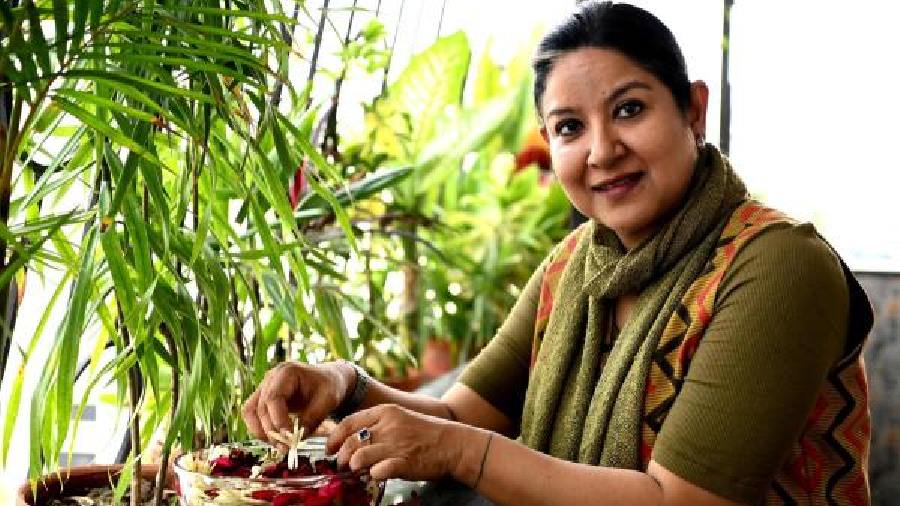Established to provide a robust platform to lesser-privileged children to pursue music, UstadGah Vilayat Khan Foundation is all set to scale its activities in the city. It has already roped in 13 NGOs operating in the city; initiatives will be taken to spot talent in music and then help them pursue advanced training in classical music and its applied forms and make a better future for them. We caught up with UstadMa Zila Khan who is carrying the vision of legendary sitarist and her father Ustad Vilayat Khan. She came down from Mumbai to kickstart this new movement in Calcutta. One of the finest exponents of Sufi and Bhakti music, she is also a strong advocate of gender equality. She has also acted in Sanjay Leela Bhansali’s Bajirao Mastani, besides doing popular theatrical plays. Excerpts.
UstadGah was started in 2008. How has the journey been so far?
I have many students who are performing worldwide. While some are in academia, teaching music, others are working with top musicians in Mumbai and singing all over the world. However, I don’t want to stop; I would like to reach out to more talents because I know India is full of talent, full of students who have the potential to make it big in the Indian classical music scene and also other kinds of music. So I want to teach kids classical music and its applied forms. I have done it in different states of India with the help of state governments but not at the scale that Mudar Patherya and I plan to do. For instance, in Delhi I have scholarships for students that not just take care of their hostels and academic expenses but instruments and gadgets as well. I want them to stay abreast of whatever is happening around them.
Did UstadGah have any presence in Calcutta before?
I would just come and give a few classes but I have never done at the scale that we will do it now.
Can we then call it the second innings of UstadGah?
Whichever innings you want to call it, you can do that but UstadGah is a first-of-its-kind institution where classical and applied classic music are being taught to make children into 360-degree artistes where they can sing and perform classical music and take it beyond its preserve. They can also perform collaborative music with artistes from India and abroad, so that their earning power is enhanced. Every child wants to have a good earning power before they choose their profession. I feel that most talented people shy away from learning shashtriya sangeet and it’s quite natural. I would have wanted shortcuts as well, if I were in their place. India has had fantastic singers. Singers who have made a big name for themselves in Bollywood tell me that if they were not enticed by success and fame at an early age then they would have pursued classical music more seriously and taken it forward. It’s a big loss for the country if potential talents are not recognised and nurtured. Classical music will live but to make it thrive these initiatives are to be taken. It’s also Ustad Vilayat Khan’s legacy and blessings on Calcutta that is making us do this.
Talking about your father, Ustad Vilayat Khan has a rich legacy in the city and carrying the baton in the city is a big responsibility, isn’t it?
We have an ancestral house on Karaya Road, Park Circus, and my cousins and I meet there at times. My father loved Calcutta so much that he desired to be buried here. So, after his death, we brought him to Calcutta and buried him next to his father. He had a house in Hastings as well. I think it’s this connection with Calcutta that brought us here and it’s his blessings that we are being able to do what we are doing. He was a visionary and was much ahead of his time. The fact that he broke the orthodoxy and encouraged me to pursue classical music and become a public performer, which traditional Ustads never allowed, is exemplary.
Coming back to UstadGah, will it operate only through NGOs or other avenues as well?
For now, we will work with NGOs and tap talents through them. However, I have plans of reaching out to people via an open channel. I will be sitting inside the Rabindra Sarobar premises and anyone who wants to showcase their talent can do it there and then. I will be there on April 29 and 30, and May 1. It’s an open call and no singer of my stature has ever done that before.
We can’t wait to see you reach out to young talents, especially girls, and guide them in the world of classical music and create more equality in this field.
It will take a few more generations for equal rights and also equal pay to become a reality. We have to move forward and think outward rather than talk about ourselves. It’s a mammoth task and it will take time. That doesn’t mean we can sit tight. UstadMa is another women’s rights thing I have started. People shouldn’t address female artists with prefixes like srimati, begum and others. If you can address a male artiste as Ustad then why not the same for female artistes? Hence I started UstadMa. Why ‘ma’ with Ustad? It’s simply because we, as women, have the power to nurture. I want to build more awareness on this topic and I organise events conferring UstadMa titles on legendary female artistes. I am also looking forward to organising such programmes in Calcutta.
Pictures: B Halder
